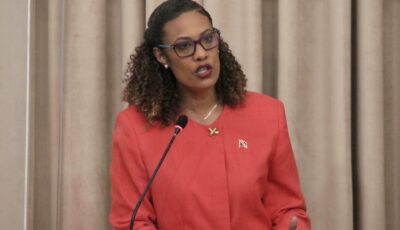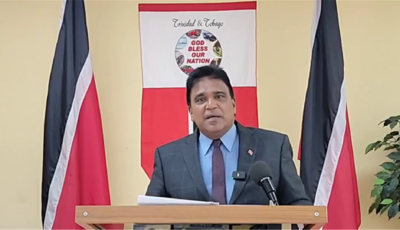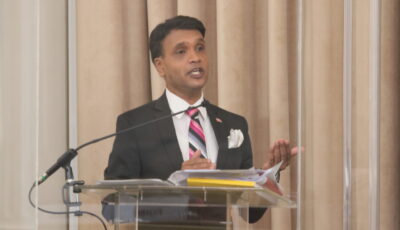Soldiers Are Not Killing Machines
 AG defends army as Defence Bill passed
AG defends army as Defence Bill passed
By Anna Ramdass anna.ramdass@trinidadexpress.com
Story Created: Mar 15, 2013 at 9:57 PM ECT
Soldiers are not killing machines. Attorney General Anand Ramlogan stressed this point as he made his final case for the Defence (Amendment) Bill 2013 which was passed at 6.53 p.m. with the Government’s majority in the House of Representatives yesterday.
The bill, which seeks to give members of the Defence Force police powers, will now go to the Senate for debate.
Government’s move to give soldiers police power through the amendment of the bill has been a contentious one, receiving no support from the People’s National Movement (PNM) as 11 members of the Opposition bench voted against the bill while 29 Government members voted in favour.
“No soldier police!” said Opposition Leader Dr Keith Rowley as he voted against the bill.
Ramlogan wrapped up the debate yesterday defending the Defence Force following soldiers being labelled “killing machines” by the Opposition.
“They stood here and vilified and attacked the soldiers … in the most malicious way, branding them killing machines, these men and women of the Defence Force who stood up for our country in our darkest hour in 1990 and defended the State,” said Ramlogan.
Ramlogan questioned how soldiers could be described as killers when they were the ones serving the people.
“These so-called killing machines that they are branding soldiers as … these are the same killing machines that are running the Civilian Conservation Corps programme, interacting with the youths between 18 and 25. These are the same killing machines that we turn to help us with in the MYPART programme … if these guys are trained to kill … then why are you allowing them to interact with youths in the country?” asked Ramlogan.
Soldiers, he added, go into schools and nursing homes and do renovation work.
He added that members of the Defence Force also have families and they should not be described as killers.
Ramlogan asked if solders were killing machines then what description were given to the criminals who are responsible for the murders in this country.
He noted that in 1970 during the uprisings and also during the 1990 attempted coup there were never any reports of soldiers killing people.
Ramlogan added that during the State of Emergency in 2011 the soldiers performed well while working with the police.
He pointed out that the Government of Antigua amended its legislation to give members of its defence force power to work with the police, outside of a state of emergency and period of war.
Ramlogan said he called the Attorney General of Antigua yesterday who confirmed this.
The AG said the Government listened to all the concern raised from different groups, including the Law Association and the Criminal Bar Association.
He said an amendment was proposed that within three months the Chief of Defence Staff must establish a code of conduct to govern soldiers when they are acting in accordance with police duties.
Ramlogan said while this already exists, it was included in the amendment to give “mental comfort” and to ensure that this code of conduct is established.
He said concerns were also raised about practical functions of the soldier while on duty with the police and it was agreed that if a person is detained in a joint exercise and an item is seized, the soldier must hand over that item to the senior officer who he is assisting.
If the senior officer is not there (may be shot) the soldier must take that item to the nearest police station.
Ramlogan explained further that members of the defence force and the Coast Guard were in a quandary when they are pursuing criminals by sea as the law does not speak to their powers on land.
Ramlogan emphasised that members of the Defence Force also need to be protected.
He again explained that if police and soldiers go on a raid and execute a search warrant for arms and ammunition and the soldier who may be outside sees someone sneaking out the building he has no power as it stands now to stop that person and the entire exercise can be compromised before his eyes.
Ramlogan added that if joint forces are conducting road blocks, the members of the defence force do not have the legal power to stop anyone in that exercise either.
He said further that private security guards have more power that members of the defence force as they operate with police powers as they are precepted.
These private security guards, unlike members of the defence force, did not take an oath to serve the country, said Ramlogan.
Ramlogan reiterated that this country was spending $1 billion annually on the defence force and its members are willing to serve to ensure law and order is maintained.








Good JOB AG ,PM Kamla and all those who worked so hard for this bill, most people would rather live in a police/soldier state than a criminal state.Thank you and all those who showed great common sense and put the security of the people of T&T first.